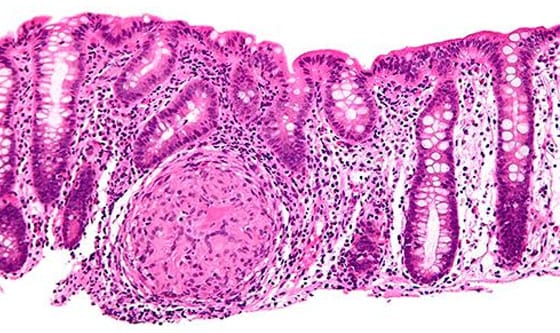Intestinal blockage
Inflammatory bowel disease includes Crohn's disease and ulcerative colitis.. Most people are diagnosed with Crohn's disease before the age of 35, and while these people may be chronic diseases There is currently no cure with conventional medicine, but it is possible with the techniques of Integrative Medicine, especially Immunogenetic Biomedicine, of which Biosalud Hospital de Dia is a pioneer in Europe.
The Crohn's disease is a long-term disease that causes inflammation in the lining of the digestive system. Although the disease can affect any part of the gastrointestinal tract, the most commonly affected areas are the end of the small intestine (ileum) or the large intestine (colon).

One of the main complications of Crohn's disease is the development of Crohn's disease. fibrosisin which the intestines become blocked by thickened or scarred connective tissueThe tubes become so narrow that food and faeces are unable to pass through.
Fibrosis is caused by an overproduction of proteins - including collagen - which is usually involved in the healing process of tissues.
Mutation disables hormone receptor, prevents fibrosis
There are no effective drugs for the treatment of fibrosis, although there has been some success in treating the inflammation associated with Crohn's disease.
Surgery and repeated surgery is common and often required to restore digestion.. About 70 percent of people with Crohn's disease need surgery and approximately 30 percent of individuals who have surgery experience a recurrence of their symptoms within 3 years and up to 60 percent will have a recurrence within 10 years.
Scientists injected mice with a type of salmonella that mimics the symptoms - including fibrosis - caused by Crohn's disease.
The team found that A particular mutation prevented the mice from developing fibrosis, and the mutation had also deactivated a hormone receptor responsible for inducing part of the immune system's response €" inflammation. The findings were published in Science Immunology.
€œWe have found what we believe to be the inflammatory cells that lead to fibrosis,€ says co-author Kelly McNagny, professor in the Department of Genetic Medicine and co-director of the Biomedical Research Centre at the University of British Columbia.
The gene that was defective in those cells is a hormone receptor, and there are drugs available that may be able to block the hormone receptor in normal cells and prevent fibrotic disease," McNagny adds.
Fibrosis is a response to chronic inflammation, but it is also a process that occurs during normal ageing. If you can reverse this, you have essentially found a way to promote regeneration rather than degeneration.
Integrative Medicine at Biosalud looks for the causes that are generating the autoimmune process, analyses the genetic load that has been activated in the patient and in this way a personalised treatment is protocolised that involves the progressive elimination of the external factors that have provoked the activation of the genetic load, as well as the deactivation of this genetic load. In many cases, this is able to halt the evolution of the autoimmune disease.
On the other hand, with today's Regenerative MedicineThe fibrosis created is being reversed in an attempt to regenerate the damaged digestive tissue.
If you have an autoimmune disease, your children may have the same genetic load, and Integrative Medicine can make sure that your children's genetic load is never activated, through a simple and inexpensive preventive treatment.
Reversing fibrosis can promote tissue regeneration
McNagny notes that the potential method of fibrosis prevention could be used for diseases leading to tissue fibrosis such as liver cirrhosis, chronic kidney disease, scarring from heart attacks, and muscle degeneration.
We think we can potentially block complications of all these age-related fibrotic diseases by reducing these particular types of inflammatory cells," McNagny concludes.
McNagny and team's future work will focus on drug trials to see if fibrosis can be halted or reversed in mice.
Source: medicalnewstoday



2 thoughts on “Enfermedad de Crohn. Nuevo tratamiento para prevenir la fibrosis”
esoy medicado mesalasina500hace 6 years ago queria saber lo nuevo para el crohn y algunas indicaciones sobre que debo hacer y comer gracias,,, esteban...
Comments are closed.